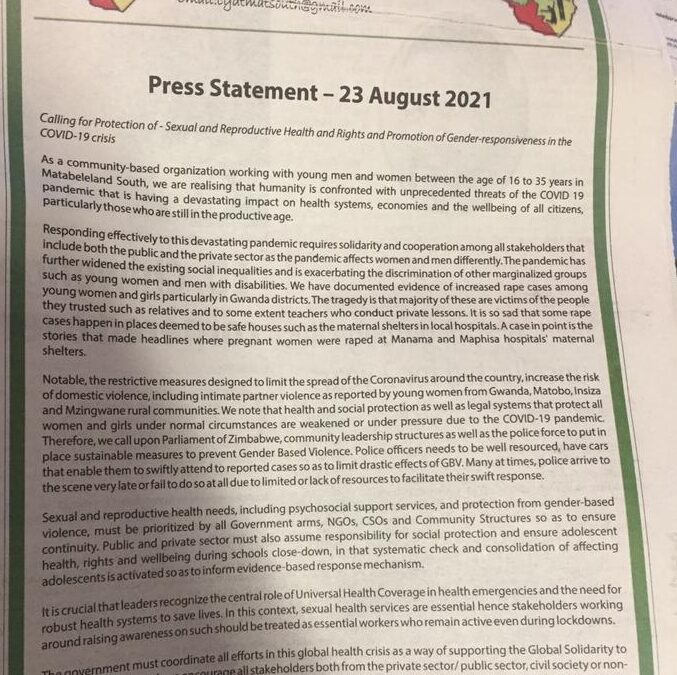Press Statement – 23 August 2021
Calling for Protection of – Sexual and Reproductive Health and Rights and Promotion of Gender-responsiveness in the COVID-19 crisis
As a community-based organization working with young men and women between the age of 16 to 35 years in Matabeleland South, we are realising that humanity is confronted with unprecedented threats of the COVID 19 pandemic that is having a devastating impact on health systems, economies and the wellbeing of all citizens, particularly those who are still in the productive age.
Responding effectively to this devastating pandemic requires solidarity and cooperation among all stakeholders that include both the public and the private sector as the pandemic affects women and men differently. The pandemic has further widened the existing social inequalities and is exacerbating the discrimination of other marginalized groups such as young women and men with disabilities. We have documented evidence of increased rape cases among young women and girls particularly in Gwanda districts. The tragedy is that majority of these are victims of the people they trusted such as relatives and to some extent teachers who conduct private lessons. It is so sad that some rape cases happen in places deemed to be safe houses such as the maternal shelters in local hospitals. A case in point is the stories that made headlines where pregnant women were raped at Manama and Maphisa hospitals’ maternal shelters.
Notable, the restrictive measures designed to limit the spread of the Coronavirus around the country, increase the risk of domestic violence, including intimate partner violence as reported by young women from Gwanda, Matobo, Insiza and Mzingwane rural communities. We note that health and social protection as well as legal systems that protect all women and girls under normal circumstances are weakened or under pressure due to the COVID-19 pandemic. Therefore, we call upon Parliament of Zimbabwe, community leadership structures as well as the police force to put in place sustainable measures to prevent Gender Based Violence. Police officers needs to be well resourced, have cars that enable them to swiftly attend to reported cases so as to limit drastic effects of GBV. Many at times, police arrive to the scene very late or fail to do so at all due to limited or lack of resources to facilitate their swift response.
Sexual and reproductive health needs, including psychosocial support services, and protection from gender-based violence, must be prioritized by all Government arms, NGOs, CSOs and Community Structures so as to ensure continuity. Public and private sector must also assume responsibility for social protection and ensure adolescent health, rights and wellbeing during schools close-down, in that systematic check and consolidation of affecting adolescents is activated so as to inform evidence-based response mechanism.
It is crucial that leaders recognize the central role of Universal Health Coverage in health emergencies and the need for robust health systems to save lives. In this context, sexual health services are essential hence stakeholders working around raising awareness on such should be treated as essential workers who remain active even during lockdowns.
The government must coordinate all efforts in this global health crisis as a way of supporting the Global Solidarity to fight COVID-19. As such we encourage all stakeholders both from the private sector/ public sector, civil society or non-governmental organizations and community health champions to join hands in supporting the emergency response, particularly in furtherance of access to and utilization of SRHR services that give full effect to the global commitment to universal access to health care.
Inserted by
Community Youth Development Trust – SRHR Thematic Desk


Recent Comments